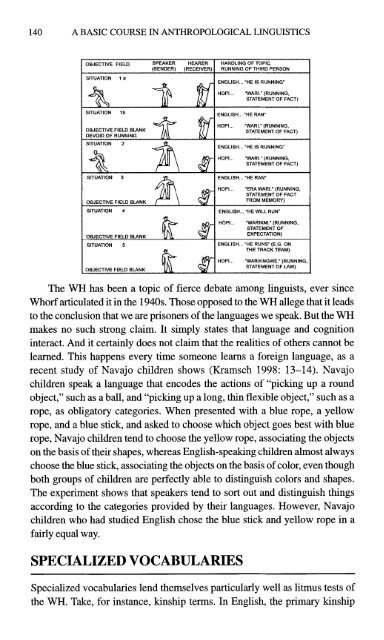A Basic Course in Anthropological Linguistics (Studies in Linguistic ...
A Basic Course in Anthropological Linguistics (Studies in Linguistic ...
A Basic Course in Anthropological Linguistics (Studies in Linguistic ...
Create successful ePaper yourself
Turn your PDF publications into a flip-book with our unique Google optimized e-Paper software.
140 A BASIC COURSE IN ANTHROPOLOGICAL LINGUISTICS<br />
OBJECTm FIELD SPEAKER HEARER HANDLING OF TOPIC,<br />
(SENDER) (RECEIVER) RUNNING OF THIRD PERSON<br />
SITUATION 1 a<br />
SITUATION lb<br />
OBJECTIVE FIELD BLANK<br />
DEVOID OF RUNNING h!J<br />
SITUATION 2<br />
SITUATION<br />
SITUATION 4<br />
OBJECTIVE FIELD BLANK<br />
SITUATION 5<br />
OBJECTIVE FIELD BLANK<br />
ENGLISH ... ”HE IS RUNNING”<br />
HOPI ... “WARI.” (RUNNING,<br />
STATEMENT OF FACT)<br />
ENGLISH ... ‘HE RAN“<br />
HOPI ... ’WARI.” (RUNNING,<br />
STATEMENT OF FACT)<br />
ENGLISH ... ”HE IS RUNNING‘<br />
HOPI ... “WARI.” (RUNNING,<br />
STATEMENT OF FACT)<br />
ENGLISH ... “HE RAN”<br />
HOPI ... ”EWIWARI.‘ (RUNNING,<br />
STATEMENT OF FACT<br />
FROM MEMORY)<br />
ENGLISH ... ‘HE WILL RUN‘<br />
HOPI ... “WARIKNI.’ (RUNNING,<br />
STATEMENT OF<br />
EXPECTATION)<br />
ENGLISH ... ‘HE RUNS” (E.G. ON<br />
THE TRACK TEAM)<br />
HOPI ... ‘WARIKNGWE.’ (RUNNING<br />
STATEMENT OF LAW)<br />
The WH has been a topic of fierce debate among l<strong>in</strong>guists, ever s<strong>in</strong>ce<br />
Whorf articulated it <strong>in</strong> the 1940s. Those opposed to the WH allege that it leads<br />
to the conclusion that we are prisoners of the languages we speak. But the WH<br />
makes no such strong claim. It simply states that language and cognition<br />
<strong>in</strong>teract. And it certa<strong>in</strong>ly does not claim that the realities of others cannot be<br />
learned. This happens every time someone learns a foreign language, as a<br />
recent study of Navajo children shows (Kramsch 1998: 13-14). Navajo<br />
children speak a language that encodes the actions of “piclung up a round<br />
object,” such as a ball, and “pick<strong>in</strong>g up a long, th<strong>in</strong> flexible object,” such as a<br />
rope, as obligatory categories. When presented with a blue rope, a yellow<br />
rope, and a blue stick, and asked to choose which object goes best with blue<br />
rope, Navajo children tend to choose the yellow rope, associat<strong>in</strong>g the objects<br />
on the basis of their shapes, whereas English-speak<strong>in</strong>g children almost always<br />
choose the blue stick, associat<strong>in</strong>g the objects on the basis of color, even though<br />
both groups of children are perfectly able to dist<strong>in</strong>guish colors and shapes.<br />
The experiment shows that speakers tend to sort out and dist<strong>in</strong>guish th<strong>in</strong>gs<br />
accord<strong>in</strong>g to the categories provided by their languages. However, Navajo<br />
children who had studied English chose the blue stick and yellow rope <strong>in</strong> a<br />
fairly equal way.<br />
SPECIALIZED VOCABULARIES<br />
Speciahzed vocabularies lend themselves particularly well as litmus tests of<br />
the WH. Take, for <strong>in</strong>stance, lunship terms. In English, the primary k<strong>in</strong>ship






